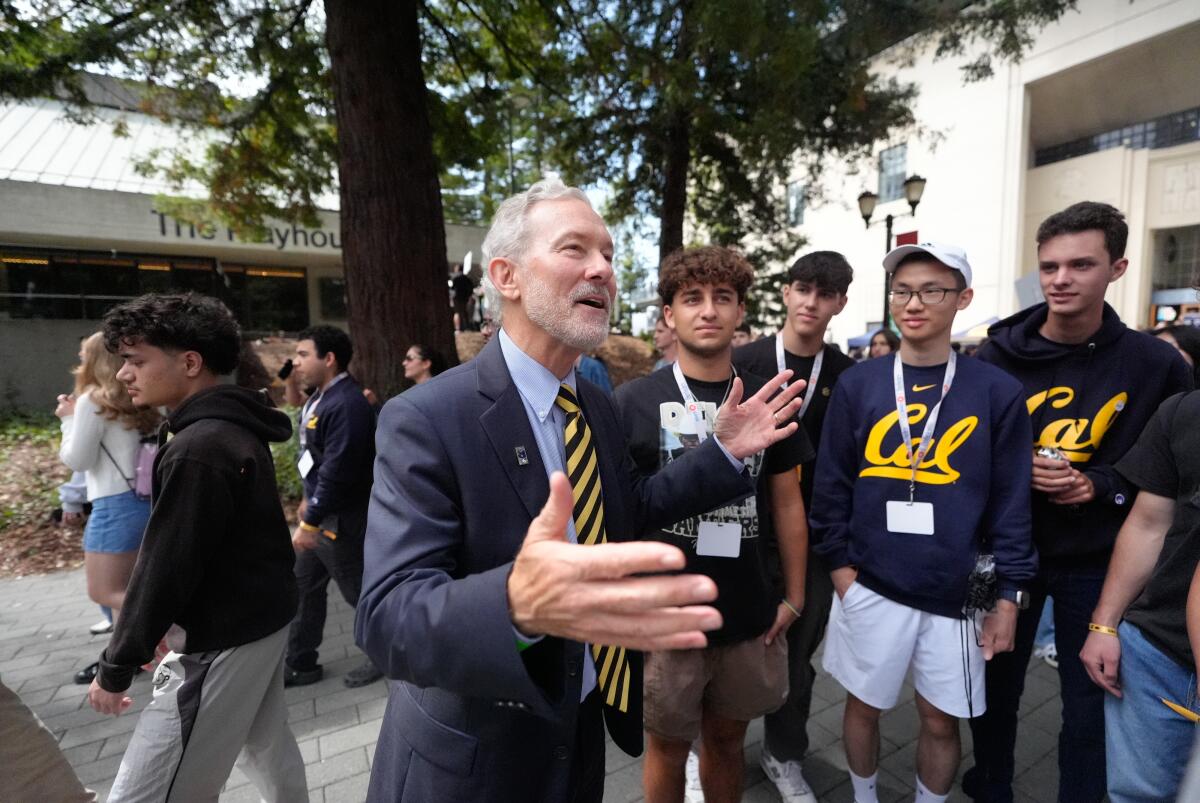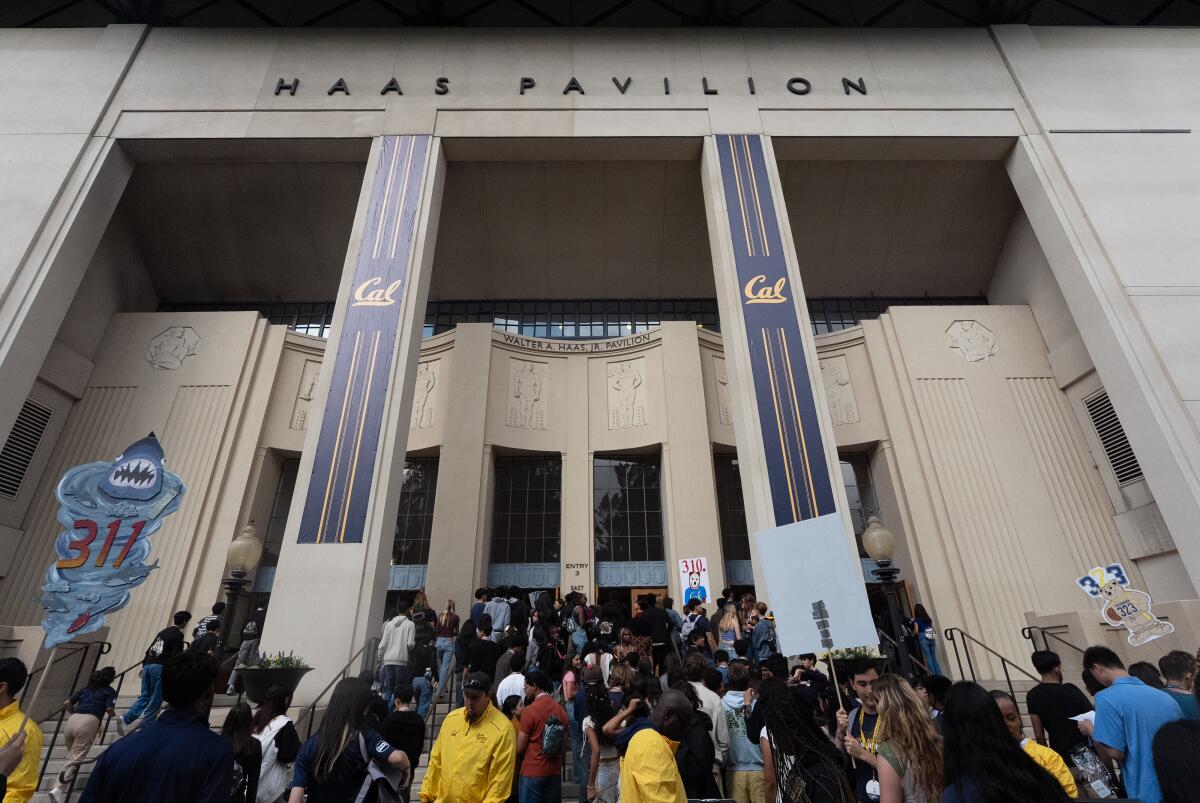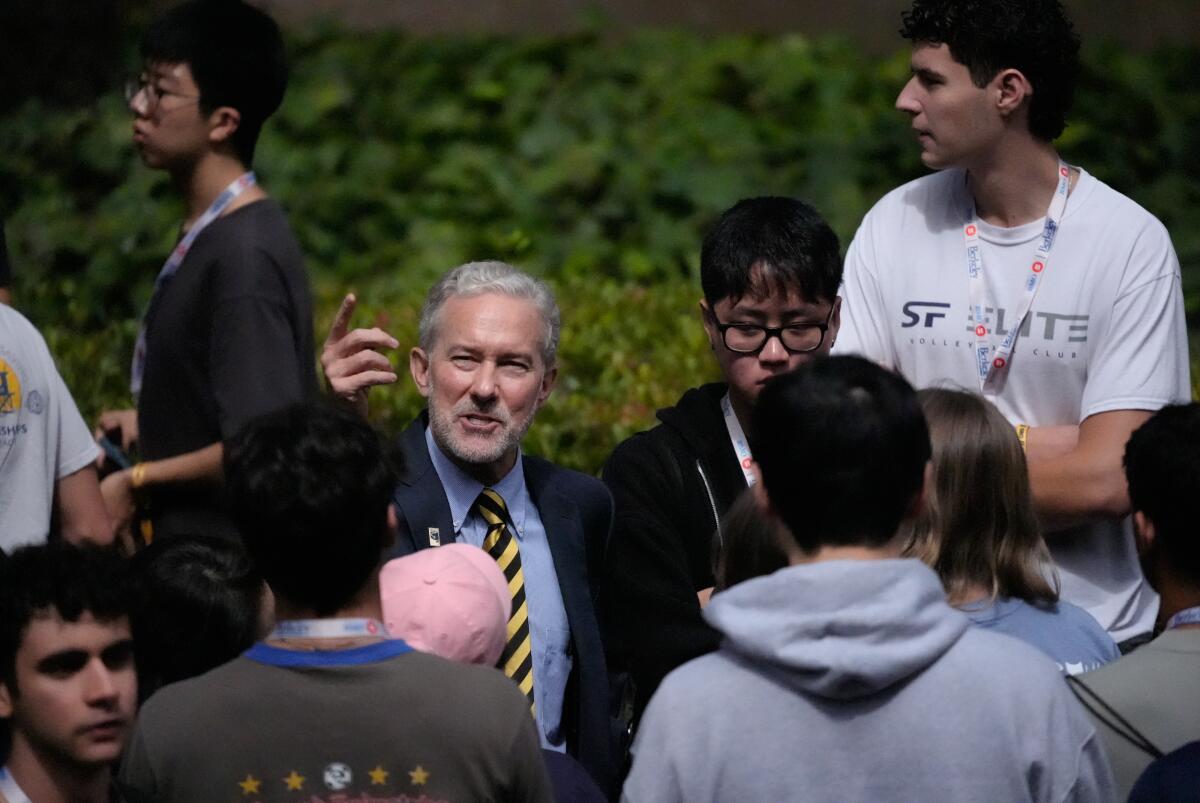
The University of California, Berkeley is probably best known as the birthplace of the student free speech movement and for its ranking among the world’s top public research universities.
But as new Chancellor Rich Lyons kicked off the new academic year last week, he leaned into a lesser-known status: It is the world’s No. 1 university for producing venture-backed startups founded by undergraduate alumni.
Speaking to 9,000 new students at their welcome ceremony Thursday at Haas Pavilion, Lyons highlighted the “grand scale” of innovation and entrepreneurship on campus and “the Berkeley way” of challenging the status quo to generate new ideas.
In an interview, Lyons emphasized that theme, saying new ideas are needed to help solve Berkeley’s toughest problem: bringing financial strength to a campus struggling with state funding deferrals and a persistent structural budget deficit. Berkeley has faced two budget shortfalls in the past eight years and another shortfall that could reach $150 million in 2024-25, partly because of rising expenses, such as mandatory pay raises. The campus has not yet decided whether to tap further into its reserves.

UC Berkeley’s new Chancellor Rich Lyons gives a pep talk to new students after convocation held at Haas Hall on Thursday.
(Paul Kuroda/For The Times)
But the campus has the potential to generate an impressive $1 billion in revenue over the next decade through entrepreneurial initiatives, said Lyons, who previously led the Haas School of Business. A professor of economics and finance, Lyons also served as associate vice chancellor and head of the Office of Innovation and Entrepreneurship before taking office in July.
“It has to be something new,” said Lyons, dressed in jeans and a “Berkeley Changemaker” top as he outlined his ideas. “It has to be big enough … to be transformative.”
Demonstrations: “We will remain firm”
Lyons, 63, also discussed the protests, which are expected to intensify this week as students return to campus. Last spring, pro-Palestinian supporters attracted international attention by setting up tent encampments in Berkeley and elsewhere. Some were peaceful gathering places for solidarity activities — Berkeley managed to reach an agreement with the protesters to voluntarily end their encampment. Others became conflict zones with counterprotesters and were forcibly dismantled by law enforcement.
This fall’s protests will receive increased attention after the University of California and California State University ordered all of their campuses to take a zero-tolerance approach to those who violate anti-encampment rules, blocking access to buildings and walkways and wearing masks to conceal their identities while committing misconduct. The directive was prompted by state lawmakers who have asked the UC and CSU to develop a “systemwide framework” to ensure consistent enforcement of the rules — and are withholding $25 million in state funding from the UC until President Michael V. Drake reports on his efforts by Oct. 1. No state funding is directly involved for the CSU.
Lyons said he would respect free speech rights but would enforce rules on how and when they could be exercised.
“There are hundreds of places on the Berkeley campus where students can express their right to free speech,” he said. “It’s part of our culture. We’re a free speech university. But to intentionally break the rules … that’s entering the world of civil disobedience, and we’re going to think about the consequences.”

Students line up to fill Haas Hall during UC Berkeley’s Welcome Convocation on Thursday.
(Paul Kuroda/For The Times)
He said the key question of when to escalate action against those who violate campus codes as part of the UC’s “multi-layered response” will depend on the situation: whether they are students or outsiders, whether they are repeat offenders, whether the action is intimidating and jeopardizes the right of all students to feel welcome and safe.
“There is no obvious answer to that question,” he said. “As chancellor, it is up to me to decide when. We intend to be consistent and firm and to respect the directive.”
Regarding the mask ban, which has drawn many questions, Lyons clarified that Berkeley would not challenge mask-wearing unless it is worn by someone who is breaking rules or laws. The campus’ written policy states: “Individuals are permitted to wear a mask, and campus staff will not ask them why they are wearing it, as long as they are not violating the law or policy by wearing the mask.” It also states that “individuals are not prohibited from wearing a mask for the purpose of avoiding doxxing, but they must comply with the policy and law when masked.”
Remain neutral on social and political issues
Lyons said he would move Berkeley toward “institutional neutrality,” a policy that states that universities should generally not take sides on social and political issues but should instead encourage students and faculty to debate them. The University of Chicago adopted the policy in 1967. Other universities followed suit after the Oct. 7 Hamas attack on southern Israel and the Israeli military retaliation in Gaza increased pressure for statements condemning one side or the other.
USC, the University of Texas and Johns Hopkins University also announced this month that they would refrain from speaking out on social and political issues unless they were directly related to their institutional missions and activities. Purdue, Stanford, Syracuse and Harvard adopted similar positions earlier this year.
“There will be fewer statements about Berkeley’s institutional position, but we’re not going to zero,” Lyons said.
To heal the divisions that have plagued Israeli-Palestinian issues, Lyons said several organizations on campus are working to foster dialogue. Proposed initiatives include trainings on media literacy, empathetic listening, healing collective trauma and a potential new course on “openness to opposing views.”
Urgent needs
Lyons also noted that Berkeley has increased its student body by 25 percent over the past decade and said funding is needed to continue growth and maintain excellence. Philanthropy can help, he said, pointing to entrepreneur Scott Galloway’s $12 million contribution to Berkeley and UCLA to support students who aren’t aiming for a four-year degree but want to train in specific fields. Berkeley is using its share to fund scholarships for adults to explore introductory courses in data analytics, facilities management or project management.
Other pressing needs — supporting humanities research, doctoral students, university libraries — require new funding, he said. Berkeley estimates that potential state funding cuts could amount to $14 million less in fiscal year 2024-25 than anticipated under the original pact with Gov. Gavin Newsom, and could increase even more next year.
Enter innovation and entrepreneurship, the subject Lyons is most passionate about. In a rapid-fire recounting of the different ways to raise money, punctuated by plenty of arm-waving, the chancellor outlined several initiatives that he believes could be a game-changer for Berkeley’s finances.

UC Berkeley’s new Chancellor Rich Lyons gives a pep talk to new students after convocation held at Haas Hall on Thursday.
(Paul Kuroda/For The Times)
He said the campus negotiates for stakes in startups, often at a lower royalty rate, to license its intellectual property and now holds shares in more than 100 companies. Philanthropists have given the campus about $75 million over the past year to invest in venture capital funds that invest primarily in Berkeley companies. The campus has received 10 percent of the returns from six different venture capital portfolios. Berkeley has also created a company called Second Lab that leases unused scientific equipment, recruits alumni founders to run it, and has negotiated to retain 16 percent of the company’s stock.
“People might look at this and say, ‘This is just crazy in the marketplace,’ but you see we have a billion dollars that we’ve acquired in a way that’s consistent with our values,” Lyons said. “We’re finding new ways to use it.”
Lyons’ energy and vision have generated enthusiasm. While her predecessor, Carol Christ, was deeply admired, she has had to deal with multiple crises: the pandemic, enrollment pressures, budget shortfalls, protests against Israel’s war with Hamas, lawsuits and demonstrations against her People’s Park housing project.
“I see this as a shift from an era of resilience to an era of hope,” said Oliver M. O’Reilly, vice provost for undergraduate education.
Undergraduate student body president Shrinidhi Gopal also said she was optimistic about Lyons and impressed by its record of integrating diversity, equity and inclusion values into the business school. She said students’ priorities this year were safety and the future of People’s Park, which is slated for student housing and support projects after the state Supreme Court removed the last legal hurdle to development in June. Gopal said students want to continue discussions about the park.
Lyons also won over fans at the new student welcome ceremony. After his speech, the chancellor jumped up to dance with Oski, the Cal Bears mascot, prompting roars from the students as the marching band played.
“We loved your dance!” one student told him.


